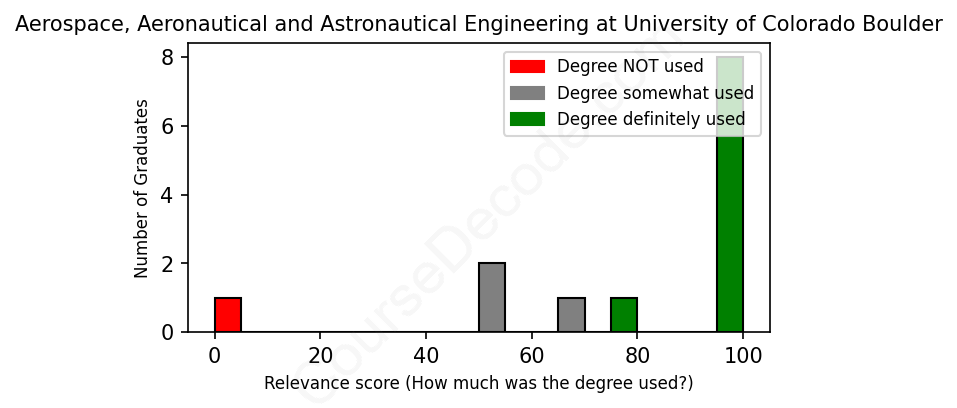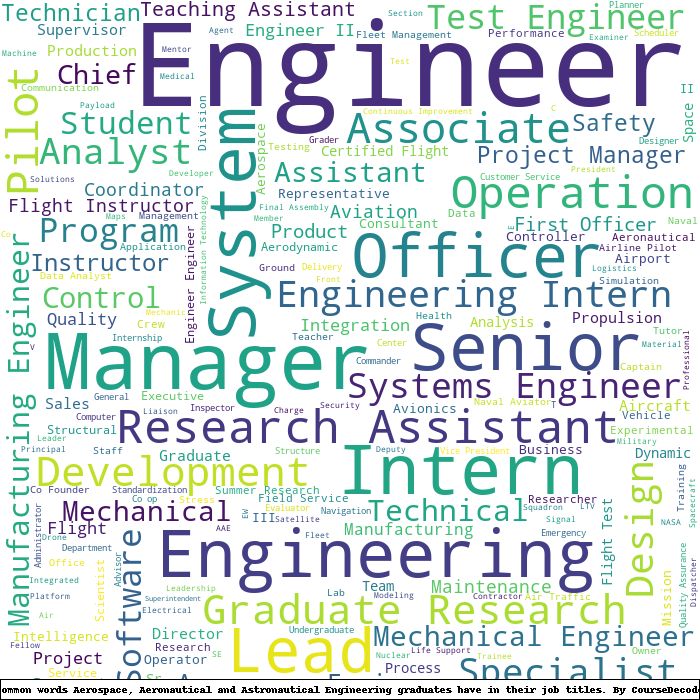
First, some facts. Of the Aerospace, Aeronautical and Astronautical Engineering graduates from University of Colorado Boulder we've analyzed , here's how many have used (or NOT used) their degree in their career:

These are estimates based on AI analysis of 13 LinkedIn profiles (see below).
The verdict? Significantly above average. Overall, with an average relevance score of 80%, Aerospace, Aeronautical and Astronautical Engineering graduates from University of Colorado Boulder have a much higher likelihood (+13%) of finding work in this field compared to the average graduate across all fields:
And for comparison, here's the chart for all profiles we've looked at across all degrees.
Also, after graduating, 38% of these graduates have pursued further education other than another Bachelor's degree (such as a Masters degree or other), compared to the average across all profiles of 35%. This suggests you may need more than just a Bachelors degree to be competitive as a Aerospace, Aeronautical and Astronautical Engineering graduate.
See the details:
|
Relevance score: 100% We think this person has gone into a career highly relevant to their degree. We think this person has gone into a career highly relevant to their degree.
DEGREE INFOGraduated in 2022 from University of Colorado Boulder with a Bachelor's degree in Aerospace, Aeronautical and Astronautical Engineering. No other secondary education since. JOB HISTORY SINCE GRADUATIONEngineer Laboratory for Atmospheric and Space Physics May 2022 - Mar 2023 ABOUTHello, my name is [NAME REMOVED] Foehr. I'm an Aerospace Engineer with a masters degree in BioAstronautics, the study of human spaceflight. I've spent several years working for the Laboratory of Atmosphere and Space Physics and for the University of Colorado, Boulder as a teaching assistant and laboratory technician. I lead the design team for the CU human spaceflight department's Mars Emergency Clinic Module, and worked on the SPRITE Cubesat during my time at LASP as a test and mechanical engineer. I have experience working as a project manager, systems engineer, test engineer, and manufacturing engineer. I've worked with thermal vacuum chambers, human factors test campaigns, life support system design, and much more! I'm very flexible and adaptable, and I enjoy communicating with others and presenting ideas. I love being part of a team, and I'm always ready for a new opportunity to learn! |
The top 10 most common jobs done by the graduates we've analyzed (ranked most common to least) are:
When looking at the job profiles of graduates from the University of Colorado Boulder with degrees in Aerospace, Aeronautical, and Astronautical Engineering, it’s clear that many have landed roles directly connected to the aerospace industry. The most common positions include roles like Aerospace Engineer, Flight Test Engineer, and Spacecraft Systems Engineer, which all heavily utilize the skills and knowledge gained during their studies. For instance, graduates working at big players like Boeing, Lockheed Martin, and Rocket Lab are often engaged in tasks that resonate strongly with their academic backgrounds in aerospace engineering, focusing on various specialized fields such as aerodynamics, spacecraft systems, and flight testing.
However, not all roles are strictly relevant to aerospace engineering. Some graduates veer into positions like Customer Support Engineer or Sales and Marketing Representative, where the direct application of their engineering knowledge is limited. This divergence highlights that while many graduates find jobs in fields that are closely related to aerospace, there’s also a noticeable chunk who explore roles that are more general or operational. Overall, though, graduates predominantly enter positions that align well with their educational experiences, especially in technical roles where their engineering expertise is front and center.
Here is a visual representation of the most common words in job titles for Aerospace, Aeronautical and Astronautical Engineering graduates (this is across all Aerospace, Aeronautical and Astronautical Engineering graduates we've analyzed, not just those who went to University of Colorado Boulder):

When looking at the career trajectories of graduates from the Aerospace, Aeronautical, and Astronautical Engineering program at the University of Colorado Boulder, it's clear that many have landed impressive jobs shortly after graduation, especially within large organizations that are well-known in the aerospace industry. For instance, graduates from recent years have secured roles at major companies like Boeing, Lockheed Martin, and Maxar Technologies, often beginning their careers as engineers in various specialties such as flight testing, spacecraft systems, and aerodynamics. The transition from college to the workforce seems to be quite fruitful, with many starting positions closely aligned with their degree and the skills they developed during their studies.
As we look five to ten years down the line, it appears that many of these graduates continue to advance within the aerospace field. For example, those who started in roles like Flight Test Engineer or Systems Engineer often move up to more senior positions, reflecting strong career progression. However, there are a few exceptions—not all graduates stick strictly to aerospace-related jobs. Some have taken paths that lead them to roles in sales and marketing, which might suggest that not every graduate's journey stays closely tied to their technical training. Overall, though, many CU Boulder alumni appear to be thriving in relevant fields, and their engineering education seems to have provided a solid foundation for successful careers in aerospace and related industries.
Hey there! So, getting a Bachelor’s degree in Aerospace, Aeronautical, and Astronautical Engineering at the University of Colorado Boulder is definitely on the challenging side. It’s not just about flying cool planes or dreaming about space; you’ll dig into some complex math, physics, and engineering principles that can feel pretty intense. The coursework tends to be rigorous, with a heavy workload and hands-on projects, so you really need to be ready to put in some serious time and effort. While it's a rewarding field, it’s fair to say that it’s usually harder than the average degree, so if you're super dedicated and passionate about aerospace, you're in for a tough but exciting ride!
Most commonly, in the LinkedIn profiles we've looked at, it takes people 4 years to finish a Bachelor degree in Aerospace, Aeronautical and Astronautical Engineering.
Alright, so here’s the scoop on these University of Colorado Boulder grads from aerospace and aeronautical engineering. Most of them seem to be heading down solid career paths with some pretty reputable companies like Boeing, Lockheed Martin, and Rocket Lab, which is a good sign—they're likely making decent money. Roles like Senior Aerospace Engineer and Spacecraft Systems Engineer typically come with nice paychecks, especially as they gain experience. Even early-career positions seem to pay well, considering the prominence of these industries. So yeah, it looks like these folks are doing pretty well for themselves financially, especially compared to what most entry-level jobs pay right after graduation.
Here is a visual representation of the most common words seen in the "about" section of LinkedIn profiles who have a Bachelor degree in Aerospace, Aeronautical and Astronautical Engineering (this is across all Aerospace, Aeronautical and Astronautical Engineering graduates we've analyzed, not just those who went to University of Colorado Boulder). This may or may not be useful:

Here are all colleges offering a Bachelor degree in Aerospace, Aeronautical and Astronautical Engineering (ordered by the average relevance score of their Aerospace, Aeronautical and Astronautical Engineering graduates, best to worst) where we have analyzed at least 10 of their graduates:
| College | Score | Count |
|---|---|---|
 Texas A&M University Texas A&M University
|
87 | 22 |
 California Polytechnic State University-San Luis Obispo California Polytechnic State University-San Luis Obispo
|
86 | 12 |
 University of Cincinnati University of Cincinnati
|
86 | 10 |
 Purdue University Purdue University
|
85 | 40 |
 Rensselaer Polytechnic Institute Rensselaer Polytechnic Institute
|
85 | 17 |
 Georgia Institute of Technology Georgia Institute of Technology
|
84 | 23 |
 Liberty University Liberty University
|
81 | 21 |
 Iowa State University Iowa State University
|
80 | 16 |
 University of Colorado Boulder University of Colorado Boulder
|
80 | 13 |
 California State Polytechnic University-Pomona California State Polytechnic University-Pomona
|
79 | 13 |
 United States Naval Academy United States Naval Academy
|
77 | 12 |
 The Ohio State University The Ohio State University
|
76 | 20 |
 University of Central Florida University of Central Florida
|
75 | 25 |
 Arizona State University Arizona State University
|
74 | 12 |
 University of Michigan University of Michigan
|
74 | 10 |
 Embry-Riddle Aeronautical University Embry-Riddle Aeronautical University
|
71 | 163 |
 Penn State University Penn State University
|
68 | 12 |
 Florida Institute of Technology Florida Institute of Technology
|
67 | 20 |
 The University of Alabama in Huntsville The University of Alabama in Huntsville
|
67 | 11 |
 Embry Riddle Aeronautical University-Worldwide Embry Riddle Aeronautical University-Worldwide
|
66 | 10 |
 University of Illinois at Urbana-Champaign University of Illinois at Urbana-Champaign
|
48 | 10 |